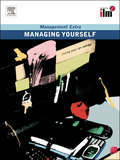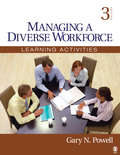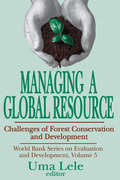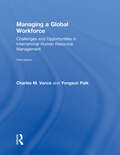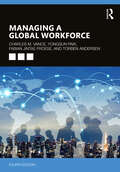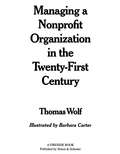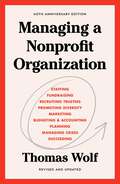- Table View
- List View
Managing Your Money All-In-One For Dummies
by Consumer DummiesWant to take control of your finances once and for all? Managing Your Money All-in-One For Dummies combines expert money management with personal finance tips. From credit cards and insurance to taxes, investing, retirement, and more, seven mini-books show you how to improve your relationship with money -- no matter your age or stage of life.This easy-to-understand guide shows you how to assess your financial situation, calculate debt, prepare a budget, trim spending, boost your income, and improve your credit score. You'll find ways to run a money-smart household, reduce waste, and cut medical and transportation expenses as you tackle your debt head-on and develop good saving habits. You'll even get help choosing the right mortgage and avoiding foreclosure, saving for college or retirement, and determining your home-, car-, and life insurance needs. Discover how to:Take charge of your financesManage home and personal financesLower your taxes and avoid tax auditsPlan a budget and scale back on expensesDeal with debt and negotiate with creditorsSave and invest safely for college or retirementProtect your money and assets from fraud and identity theftEnsure a comfortable retirementPlan your estate and safeguard a will or trustManaging Your Money All-in-One For Dummies brings you seven great books for the price of one. Can you think of a better way to start managing your money wisely?
Managing Your Money All-in-One For Dummies
by The Experts at DummiesA hands-on, power-packed guide to managing all things money Time and money. Those are the two most important assets you have, and smart people manage both of them wisely. Managing Your Money All-in-One For Dummies is your one-stop resource to turn to when you’re ready to manage your money. It offers everything you need to confidently handle your finances. When you’re ready to create a budget, pay down debt, and scale back your expenses, you’ll find the support you need here. If you’re eyeing the future, you’ll find advice on improving your credit score, saving for college and retirement, and planning an estate. As if all of that isn’t enough, this comprehensive book covers other financial topics such as buying insurance, investing in your 401(k), and so much more. The authors of Managing Your Money All-in-One For Dummies explain how to handle your money in a way that encourages you to think and act positively, no matter what your financial situation looks like. And as you move toward financial freedom, you can come back to this book to get advice on topics that go beyond day-to-day money management, such as taking out a mortgage, investing online, and more. Get your financial life in order, whatever your stage of life Make a budget, manage your credit, and pay down your debt Demystify financial reports, online investing, and retirement plans Save for college and learn how to balance your saving and spending habits in any economy Navigate the new norm of online bankingSpend some time learning how to manage your money today. It’ll be a wise investment of both of your most valuable assets.
Managing Your Money: Be a Wise Consumer
by Barbara SimonsManaging Your Money: Be a Wise Consumer by Barbara Brooks Simons.
Managing Your Personal Finances
by Joan S. Ryan Christie RyanWhile focusing on the student's role as citizen, student, family member, consumer, and active participant in the business world, MANAGING YOUR PERSONAL FINANCES 7E informs students of their various financial responsibilities. This comprehensive text provides opportunities for self-awareness, expression, and satisfaction in a highly technical and competitive society. Students discover new ways to maximize their earning potential, develop strategies for managing their resources, explore skills for the wise use of credit, and gain insight into the different ways of investing money. Written specifically for high school students, special sections in each chapter hold student interest by focusing on current trends and issues consumers face in the marketplace.
Managing Your Personal Finances
by Joan Ryan Christie RyanWhile focusing on the student's role as citizen, student, family member, consumer, and active participant in the business world, MANAGING YOUR PERSONAL FINANCES 7E informs students of their various financial responsibilities. This comprehensive text provides opportunities for self-awareness, expression, and satisfaction in a highly technical and competitive society. Students discover new ways to maximize their earning potential, develop strategies for managing their resources, explore skills for the wise use of credit, and gain insight into the different ways of investing money. Written specifically for high school students, special sections in each chapter hold student interest by focusing on current trends and issues consumers face in the marketplace.
Managing Your Personal Finances
by Joan S. RyanChallenges students with vocabulary exercise, review questions, problem-solving activities, financial check-ups, and template disk activities.
Managing Your Personal Finances
by Joan S. RyanWhile focusing on the student's role as citizen, student, family member, consumer, and active participant in the business world, Managing Your Personal Finances 6E informs students of their various financial responsibilities. This comprehensive text provides opportunities for self-awareness, expression, and satisfaction in a highly technical and competitive society. Students discover new ways to maximize their earning potential, develop strategies for managing their resources, explore skills for the wise use of credit, and gain insight into the different ways of investing money. Written specifically for high school students, special sections in each chapter hold student interest by focusing on current trends and issues consumers face in the marketplace.
Managing Your Personal Finances
by Joan S. RyanCurrent and fresh, yet firmly rooted in proven personal financial management techniques, this text features a conversational writing style that is highly readable and understandable. Covers the individual's roles and financial responsibility as a student, citizen, family member, consumer, and employee.
Managing Your Personal Finances (4th edition)
by Joan S. RyanInform your students of their financial responsibilities as a citizen, student, family member, consumer, and active participant in the business world. The new edition of Managing Your Personal Finances will provide them with opportunities for self-awareness, expression, and satisfaction in a highly technical and competitive society. Discover new ways to maximize earning potential, develop strategies for managing resources, explore skills for the wise use of credit, and gain insight into the different ways of investing money.
Managing Your Recovery from Addiction: A Guide for Executives, Senior Managers, and Other Professionals
by Bruce Carruth David F O'Connell Deborah BevvinoLearn how to get sober-and stay that wayGetting and staying sober provides a special set of challenges for professional people-physicians, lawyers, corporate CEOs, accountants, and others-who drive themselves to achieve and succeed in high-pressure surroundings. Managing Your Recovery from Addiction applies business approaches and ideas to the process of planning, implementing, and carrying out programs that really work for professionals in their first year of recovery. This unique self-help book provides guidance to impaired executives and professionals seeking recovery through inpatient and outpatient care, setting strategies for managing conflict, dealing with changing emotions and moods, and developing a solid spiritual program. Managing Your Recovery from Addiction helps professionals develop both short- and long-term programs for dealing with the challenges of maintaining sobriety. The book is based on the authors&’ extensive experience treating impaired business personnel in a variety of settings, including the Caron Treatment Centers and Lifeworks of London, England, an internationally recognized addictions treatment center. Their rational, scientific approach complements ongoing counseling and other treatment approaches to help keep the professional&’s career on track, saving the recovering individual-and his or her employer-significant time and money due to lower productivity, arrested organizational development, absenteeism, and other problems associated with professional level addiction. Topics examined in Managing Your Recovery from Addiction include: a unique view of the 12 Steps for business personnel the dynamics of managerial addiction essential information to prevent relapse to active addiction coping with relapse basic tasks and fundamental recovery steps setting and tracking recovery goals recovery stages 10 tasks to recovery conflict management strategies spiritual development addictions treatment and much more!Managing Your Recovery from Addiction concludes with the O&’Connell Dysfunctional Attitude Survey (ODAS). This book is vital for recovering executives and professionals and is an important resource for addictions and mental health treatment agencies that serve a professional population. It&’s equally helpful for employee assistance program (EAP) personnel who regularly refer professionals for addictions treatment.
Managing Your Team
by Linda A. HillDesigned as an overview note for the Managing Your Team module of the MBA second year elective course Power and Influence. Identifies some criteria for evaluating team effectiveness and outlines in detail the key areas of responsibility of team managers: managing the team's boundary, and managing the team itself (including designing the team and facilitating the team's process). Also contains a brief appendix on managing transnational teams as well as substantial bibliographic references for further reading.
Managing Your Time: Making the Most Out of Your Day
by Richard LueckeTime management is about forcing yourself to be explicit about what you value in your professional and personal life, which in turn helps avoid burnout stress while making you more productive. This chapter gives you the tools to manage your work week better while avoiding time wasters such as overreaching, reverse delegation, procrastination, avoidable travel, and unnecessary meetings.
Managing Yourself In A Week: The Success Toolkit For Managers In Seven Simple Steps
by Martin ManserManaging yourself just got easierOne of the most important aspects of being a manager is being able to manage yourself and the first step to doing this effectively is becoming aware of yourself and evaluating your strengths and weaknesses. In Managing Yourself In A Week you will learn about good time management and organization skills including planning and setting priorities, dealing with time wasters, and practical steps on maintaining a diary and to-do lists. You will explore techniques such as managing your mind and learn about the power of positive thinking in developing strategies and making good decisions. You will learn about managing emotions, increasing confidence, dealing with nerves, motivating yourself and building strong relationships by applying good listening skills. The final chapter, on managing stress, looks at what produces stress in you and discusses ways of dealing with its consequences. Managing Yourself in a Week gives handy guidelines that will enable you to take a grip on yourself and re-evaluate your way of working and your priorities in life. It is a quick and reliable guide to the basics of self-management in the world of work.Over this week-long course you will cover:- Sunday: Know yourself well- Monday: Manage your focus clearly- Tuesday: Manage your time effectively- Wednesday: Manage your mind decisively- Thursday: Manage your emotions carefully - Friday: Manage your relationships successfully- Saturday: Manage stress thoroughly
Managing Yourself Revised Edition: Revised Edition (Management Extra Ser.)
by ElearnStuck for ideas, inspiration or just want to work differently? Management Extra brings all the best management thinking together in one package. The books are practical and well structured to provide an in depth treatment of these management topics. Titles in the series: * Business Environment * Change Management * Development for High Performance * Effective Communications * Financial Management * Information and Knowledge Management * Leadership and Management in Organisations * Leading Teams * Making Sense of Data and Information * Managing Markets and Customers * Managing for Results * Managing Health, Safety and Working Environment * Managing Legal and Ethical Principles * Managing Yourself * Positive Working Relationships * Project Management * Quality and Operations Management * Reaching Your Goals Through Innovation * Recruitment and Selection * Reputation Management The series fuses key theories and concepts with applied activities to help managers examine how they work in practice. The books are created with individuals in mind. They are designed to help you improve your management skills. Management Extra can also be used in conjunction with management programmes of study aligned to standards. Each of the books has case studies, self assessments and activities all underpinned by knowledge and understanding of the frameworks and techniques required to improve performance. Management Extra provides managers and trainers with a handbook for action and development. "You found it – what a find! A practical resource packed with all the relevant theory and suggested activities to support your professional development. An essential resource to have at your fingertips, jump in and enjoy."--Russell Jeans, Learning and Development Manager, ntl "All the essential concepts are here, presented in an easily digestible format with lots of up to date case studies and references – but, most importantly, with plenty of thought provoking activities and self-diagnostic exercises to make the learning personal and transferable."--Peter Manning, Head of Training & Development, News International Newspapers Ltd
Managing a Chinese Partner
by Lub Bun ChongFrom 2007 to 2009, French food and beverage giant Danone and Chinese entrepreneur Zong Qinghou who is ranked number one on Forbes' China Rich List 2012 were embroiled in a highly rancorous dispute over their joint venture, Hangzhou Wahaha. It transpired that even French President Sarkozy reportedly found time in his 2007 three-day state visit to China to discuss the 'Wahaha' dispute with his Chinese counterpart, President Hu. Behind the melodrama of the 'Wahaha' dispute lies an important lesson for foreign companies in China. As a result of the global shift in power, the imperative for a foreign company to manage its Chinese Partner has never been stronger since China re-opened its doors for business in 1978. By drawing on the experiences of Danone, Nestle, Coca-Cola and SABMiller, this book provides an insight into why, as well as, how the managing of a Chinese Partner can deliver sustainable value for a joint venture in China. "
Managing a Diverse Workforce: Learning Activities
by Gary N. PowellExperiential activities help students understand workplace diversityThis book shows readers how to create an inclusive work environment and culture that can value and leverage the contributions of all members, regardless of personal characteristics that are not pertinent to the job. To achieve this, the book provides a comprehensive set of learning activities that address issues related to workplace diversity. Drawing on a variety of work settings, including both business and not-for-profit organizations, Managing a Diverse Workforce, Third Edition will be an invaluable asset for human resource development courses in departments of management, public administration, and human services. It is a perfect companion to core texts on workforce diversity, including Gary Powell′s Women and Men in Management, Fourth Edition (SAGE).
Managing a Global Resource: Challenges of Forest Conservation and Development (World Bank Series On Evaluation And Development Ser. #Vol. 5)
by Uma LeleThe rapid loss of tropical forests, particularly in the developing world, has been a global concern since the late 1980s and has prompted a variety of international initiatives to save the forests. In 1991, the World Bank responded to global concerns and to criticism by nongovernmental organizations by forming a conservation-oriented forest strategy. Managing a Global Resource is an outgrowth of the independent evaluation conducted by the World Bank's Operations Evaluation Department and discusses how effectively that strategy was implemented. In this detailed investigation, Uma J. Lele explores why the loss of forests and biodiversity has been so rapid in some developing countries (Brazil, Indonesia, and Cameroon) and not in others (China, India, and Costa Rica). She assesses future prospects for conservation in these six countries by critically examining their policies, institutional arrangements, and emerging national and international instruments to conserve forests and biodiversity. Together these six countries account for 25 percent of the world's forest cover and 44 percent of the world's population. Managing a Global Resource presents case studies of the forest sectors of each country in the context of overall development policies, interest groups, and governance issues. Lele's investigation finds a fundamental divergence in forest-rich countries between the global objectives of conservation and the local objectives of development and private profit. In some forest-poor countries, in contrast, natural resource loss has led the countries on their own accord to adopt a variety of conservation-oriented policies and programs. Despite the greater congruence between the global and national objectives in these forest-poor countries, competing demands on their resources and the constraints on their policies, institutions, and human capital make it difficult for them to affect forest and biodiversity conservation. This volume makes it clear that
Managing a Global Team: Greg James at Sun Microsystems, Inc. (A)
by Tsedal Neeley Thomas J. DeLongGreg James, a global manager at Sun Microsystems, Inc., sets out to meet with his entire 43-member customer implementation team spread across India, France, the United Arab Emirates, and the United States of America to resolve a dire customer system outage as required by a service agreement. Rather than finding a swift resolution to the rapidly escalating customer situation that motivated his trip, he finds himself facing distributed work, global collaboration, conflict and management issues that are threatening to unravel his team.
Managing a Global Team: Greg James at Sun Microsystems, Inc. (A)
by Thomas J. Delong Tsedal NeeleyGreg James, a global manager at Sun Microsystems, Inc., sets out to meet with his entire 43-member customer implementation team spread across India, France, the United Arab Emirates, and the United States of America to resolve a dire customer system outage as required by a service agreement. Rather than finding a swift resolution to the rapidly escalating customer situation that motivated his trip, he finds himself facing distributed work, global collaboration, conflict and management issues that are threatening to unravel his team.
Managing a Global Team: Greg James at Sun Microsystems, Inc. (B)
by Tsedal NeeleyThis case updates students on the steps Greg James took to solve the problems that instigated the crisis documented in "Managing a Global Team: Greg James at Sun Microsystems, Inc. (A)." We find out how James solves the process problems involved in his team's breakdown and creates team cohesion to help them function together effectively. We also learn whether or not James is successful in taking his global team to a new level of productivity and customer service.
Managing a Global Workforce
by Yongsun Paik Charles M. VanceThis new edition of Managing a Global Workforce provides balanced and contemporary coverage of human resource management in the international marketplace. Directed at future general managers and international executives, rather than HR specialists, it is designed to help students as well as professionals recognize the critical human resource issues underlying the cultural and economic challenges they face.
Managing a Global Workforce: Challenges And Opportunities In International Human Resources Management
by Yongsun Paik Fabian Jintae Froese Charles Vance Torben AndersenManaging a Global Workforce examines important human resource management issues and practices in today’s global marketplace, helping current and future managers and leaders, regardless of nationality, in making effective human talent management decisions for optimal organizational performance. This fourth edition includes significant updates to reflect recent global developments affecting the management of global HRM, including the following: • The COVID-19 pandemic and its impact on new work expectations/arrangements; • The Great Resignation; • AI and automation; • Managing diversity, equity, and inclusion; • Climate change; • Emerging economies; and • CSR/ethics/sustainability The new edition also includes several new opening and closing brief cases to promote applied reflection and discussion, as well as updated references to important research. With its practical, real-world emphasis, including frequent use of current examples, the text also serves as a useful resource for guiding the global workforce management and decision-making of current and future general managers and human resource practitioners. This book is essential reading for general graduate and undergraduate business students, as well as those in specialty programs in International Business and Human Resources.
Managing a Hospital: How to Succeed as a Clinical Leader in the Post-Pandemic Age (Business Guides on the Go)
by Otto Armin SmisethThis book demonstrates how hospitals can be transformed into dynamic, patient-centered, and cost-effective organizations. It describes systems for providing safe, high-quality medical services and outlines the importance of data for health outcomes. In this regard, the book underscores the importance of decision-making and delegation, as well as the effective use of administrative staff, new technologies, and evidence-based medicine to benefit patients and boost efficiency. At the same time, it emphasizes the importance of applying metrics to improve cost-effectiveness. Although primarily intended as a hands-on book for clinical leaders, it also considers hospitals from a broader societal perspective, making it of interest to leaders at all organizational levels in hospitals and to policymakers alike.
Managing a Nonprofit Organization in the Twenty-First Century
by Thomas WolfSince this classic work was originally published in 1984, there have been major shifts in the nonprofit world -- the growth of more profit-oriented ventures, the overhaul of accounting rules, new partnerships, and an emphasis on customer-oriented service and leadership. In easy-to-understand language, Thomas Wolf explains how to cope with these changes and deal with the traditional challenges of managing staff, trustees, and volunteers.
Managing a Nonprofit Organization: 40th Anniversary Revised and Updated Edition
by Thomas WolfMANAGING A NONPROFIT ORGANIZATION has been an essential resource for nonprofit administrators, managers, and business professors since 1984. It is a classic in its field. But much has changed since it was last updated in 1999, as the United States reels from political, economic, and demographic shifts, all of which impact nonprofit organizations every day. In the current economy, nonprofits are trying to make ends meet. They are responding to technological innovation in the age of social media and viral marketing. Nonprofit administrators, trustees, and volunteers need Thomas Wolf's solid advice now more than ever. So do the many college and university students preparing for work in the nonprofit arena. Dr. Wolf's update of Managing a Nonprofit Organization includes material that tackles the demands and challenges faced by nonprofit managers as a result of the legislative and policy changes enacted after 9/11 and in the wake of the economic collapse of 2008. Highlighting the generational issues facing many nonprofits, as current management ages and a younger generation prepares to take the reins, Dr. Wolf suggests ways for organizations to best manage these transitions and adapt to a rapidly changing world. In easy-to-understand language and with study questions at the end of each chapter, Dr. Wolf explains how to cope with all the changes, giving you everything you need to know to be a highly successful nonprofit leader.











